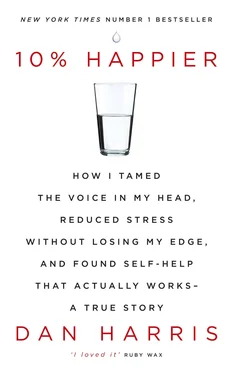10% Happier:
How I Tamed the Voice in My Head, Reduced Stress Without Losing My Edge, and Found Self-Help That Actually Works—A True Story
We are in the midst of a momentous event in the evolution of human consciousness, but they won’t be talking about it in the news tonight.
—Eckhart Tolle, self-help guru
Open up your mind, in pours the trash.
—Meat Puppets, “desert punk” band
Conveniently for me, most of the events described in this book were recorded, either by television cameras or the Voice Memos app on my iPhone. When conversations were not recorded, I reproduced the quotes from memory and, in most cases, ran them by the participants. In some places, I cleaned up the dialogue (excising ums and ahs , etc.) to make it more readable, or to make myself look smarter.
I initially wanted to call this book The Voice in My Head Is an Asshole . However, that title was deemed inappropriate for a man whose day job requires him to abide by FCC decency standards.
It’s true, though. The voice in my head can be a total pill. I’d venture to guess yours can, too. Most of us are so entranced by the nonstop conversation we’re having with ourselves that we aren’t even aware we have a voice in our head. I certainly wasn’t—at least not before I embarked on the weird little odyssey described in this book.
To be clear, I’m not talking about “hearing voices,” I’m talking about the internal narrator, the most intimate part of our lives. The voice comes braying in as soon as we open our eyes in the morning, and then heckles us all day long with an air horn. It’s a fever swamp of urges, desires, and judgments. It’s fixated on the past and the future, to the detriment of the here and now. It’s what has us reaching into the fridge when we’re not hungry, losing our temper when we know it’s not really in our best interest, and pruning our inboxes when we’re ostensibly engaged in conversation with other human beings. Our inner chatter isn’t all bad, of course. Sometimes it’s creative, generous, or funny. But if we don’t pay close attention—which very few of us are taught how to do—it can be a malevolent puppeteer.
If you’d told me when I first arrived in New York City, to start working in network news, that I’d be using meditation to defang the voice in my head—or that I’d ever write a whole book about it—I would have coughed up my beer through my nose. Until recently, I thought of meditation as the exclusive province of bearded swamis, unwashed hippies, and fans of John Tesh music. Moreover, since I have the attention span of a six-month-old yellow Lab, I figured it was something I could never do anyway. I assumed, given the constant looping, buzzing, and fizzing of my thoughts, that “clearing my mind” wasn’t an option.
But then came a strange and unplanned series of events, involving war zones, megachurches, self-help gurus, Paris Hilton, the Dalai Lama, and ten days of silence that, in a flash, went from the most annoying to the most profound experience of my life. As a result of all of this, I came to realize that my preconceptions about meditation were, in fact, misconceptions.
Meditation suffers from a towering PR problem, largely because its most prominent proponents talk as if they have a perpetual pan flute accompaniment. If you can get past the cultural baggage, though, what you’ll find is that meditation is simply exercise for your brain. It’s a proven technique for preventing the voice in your head from leading you around by the nose. To be clear, it’s not a miracle cure. It won’t make you taller or better-looking, nor will it magically solve all of your problems. You should disregard the fancy books and the famous gurus promising immediate enlightenment. In my experience, meditation makes you 10% happier. That’s an absurdly unscientific estimate, of course. But still, not a bad return on investment.
Once you get the hang of it, the practice can create just enough space in your head so that when you get angry or annoyed, you are less likely to take the bait and act on it. There’s even science to back this up—an explosion of new research, complete with colorful MRI scans, demonstrating that meditation can essentially rewire your brain.
This science challenges the common assumption that our levels of happiness, resilience, and kindness are set from birth. Many of us labor under the delusion that we’re permanently stuck with all of the difficult parts of our personalities—that we are “hot-tempered,” or “shy,” or “sad”—and that these are fixed, immutable traits. We now know that many of the attributes we value most are, in fact, skills , which can be trained the same way you build your body in the gym.
This is radical, hopeful stuff. In fact, as I discovered, this new neuroscience has led to the flowering of an elite subculture of executives, athletes, and marines who are using meditation to improve their focus, curb their addiction to technology, and stop being yanked around by their emotions. Meditation has even been called the “new caffeine.” I suspect that if the practice could be denuded of all the spiritual preening and straight-out-of-a-fortune-cookie lingo such as “sacred spaces,” “divine mother,” and “holding your emotions with love and tenderness,” it would be attractive to many more millions of smart, skeptical, and ambitious people who would never otherwise go near it.
One of the questions I hear most often from skeptics is: If I quiet the voice in my head, will I lose my edge? Some think they need depression to be creative or compulsive worry to be successful.
For the past four years, I’ve been road testing meditation in the crucible of one of the most competitive environments imaginable, television news. I’m here to tell you, it’s totally doable. More than that, it can give you a real advantage—and, not for nothing, it might even make you nicer in the process. Yes, as you will see, I did stumble into a few embarrassing pitfalls along the way. However, with the benefit of my experience, you should be able to avoid them.
What I’m attempting to do in this book is demystify meditation, and show that if it can work for me, it can probably work for you, too. The best way to illustrate this is to give you, as we say in the business, “exclusive access” to the voice in my head. All of us struggle to strike a balance between the image we present to the world and the reality of our inner landscape. This is particularly tricky for a news anchor, whose job is to project calm, confidence, and (when appropriate) good cheer. Most of the time, my external presentation is authentic; at baseline, I’m a happy guy who is keenly aware of his good fortune. But there are, of course, moments when my interior reality is a bit more complicated. And for the purposes of this book, I am going to put a magnifying lens directly on the knotty stuff.
The story begins during a period of time when I let the voice in my head run amok. It was during the early part of my career; I was an eager, curious, and ambitious cub reporter who got swept up, and swept away—and it all culminated in the single most humiliating moment of my life.
According to the Nielsen ratings data, 5.019 million people saw me lose my mind.
It happened on June 7, 2004, on the set of Good Morning America . I was wearing my favorite new tie and a thick coating of makeup. My hair was overly coiffed and puffy. The bosses had asked me to fill in for my colleague Robin Roberts as the News Reader. The job basically entailed coming on and anchoring brief news updates at the top of each hour.
Читать дальше












